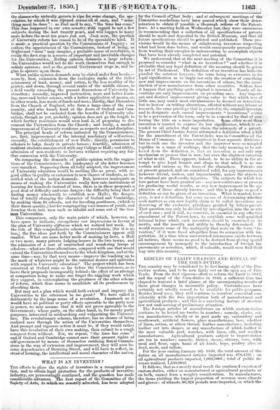WHAT IS AN INVENTION ?
THE efforts to place the rights of inventors in a recognized posi- • ties, and to obtain legal protection for the prodnctauf inventive industry, are perseveringly continued, and the question has made' considerable advances. The first report of the Committee of the; Seciety.of Arts, to which we reeently adverted, bag hem adopted
by the Council ofthat body; and at atibsequent meetings of the Poranaittee resolutions have been -passed which ' show their deter- mination to obtain if possible a -thorough reform of the Patent- laws. At a meeting held on Wednesday last, they were unanimous in recommending that a oolleetion of all specifications of patents should be made and deposited in the British Museum, and-that all future specifications should be printed and published. These pro- visions would be the means of enlightening inventors .respeeting what had been done before, and would consequently prevent them from wasting their energies in endeavouring to accomplish objects that have been already completed and patented.
We understand that at the next meeting of the.Committeeit is proposed to consider " what is an invention ? " and whether it is advisable that any legal definition of the meaning should be given by set of Parliament. The definition of an invention has hitherto puzzled the astutest lawyers; the term being so extensive iu its ' legal signification as to 'imply not only the creation of something new and improvements on the inventions of *there, but the intro- duction of new manufactures from other countries. Seldom does it happen that anything quite original is invented. • Nearly all in- ventions are only improvements on preceding ones. Any import- ant
ant and distinct improvement giving value to that which was of little use, may under most circumstances be deemed an invention ; but to bestow on trifling alterations, effected without any labour or research, the same privilege that is granted to the -original inventer, - and to designate such casual improvements " inventions,' -seems ., to be a perversion of the term, only to be exceeded by that of eM- it ferring the title on a mere importation. me othdr wortlithan s•
invention is wanted to express its law sign cation, whichni ex- tended to all articles that may claim =the m opoly of a patent. The present Chief Justice Jervis attempted's. definition when a bill for the amendment of the Patent-laws watein Committee of the • House of Commons. It was comprised in four separate divisions ; but in each one the inventor and the improver were so-mingled together in a mass of verbiage, that-the only-meaning to' be col- lected from the definition is, that an invention is not only any mechanism or process that is new, but even the slightest variation of what is old. There appears, indeed, -to be no utility in the at- tempt to give legal bounds and shape to that which is as un- certain and various as the hues of the chameleon. Patents are at present granted, and are considered valid, for any improvements however trivial, useless, and impracticable, unless the objects to be attained are professedly injurious. The subjects forwhieh let- ters.patent have been granted are---enynew contrivance or process ' for producing useful results, or any new improvement in the ap- plication of those already known : and 'this is perhaps as good a definition -as can be given- of an invention. What is wanted,- how- ever, is not a definition, but some means of determining-whether • such matters as can now legally claim to be called inventions are deserving of the exclusive , privileges granted• liy. . letters-patent. That question can only be:decided by investigation into the merits of each case ; and it will, we conceive, be essential in any effective amendment of the Patent-laws, to establish- some well-qualified tribunal before which each • invention should- be 'examined on its merits, and the novelty and utility be thereby determined. It would remove some of the ambiguity that rests on the term " in- vention," if it were freed altogether from its connexion with ha- • portation. At a time when unrestricted intercourse exists between all nations, there seems no good to be derived from giving special encouragement by monopoly to the introduction of foreign im- provements or novelties, which, if valuable, would- soon find'their way into this country.
























 Previous page
Previous page